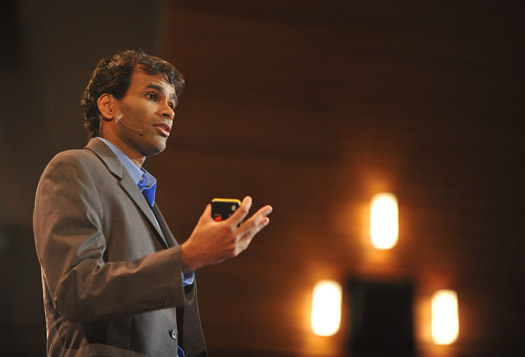Photo: Sendhil Mullainathan at TEDIndia, Session 4, “Reinventing Development,” November 6, 2009, in Mysore, India. Credit: TED / James Duncan Davidson
Session 4 of TEDIndia, “Reinventing Development,” brought together some of the most innovative minds working in India’s development sector. Here’s what they told us:
Sendhil Mullainathan looks at a frustrating issue in public health in India: the “Last Mile Problem.” The fight to reduce deaths from diarrhea, for example, has stalled, even after making huge improvements for many years. The problem, he suggests, doesn’t have to do with flaws in our technological solutions — but with errors in human intuition. One shocking study found that 35-50% of women incorrectly believe reducing fluids intake was key to helping their children recover from diarrhea. (“The mental model doesn’t match reality.”) By re-casting problems in ways the human mind can better grasp, we can encourage innovative solutions. He shares several examples, from improving energy conservation rates to proper use of insulin shots. He applies this thinking to his own thesis: “Maybe the Last Mile Problem should be called the Last Mile Opportunity?” 99% of the journey may be about science, but we ought not forget that social psychology, art and education may be key to solving the last 1%, the “last mile.” Read about Sendhil Mullainathan on Edge.org >>
Shukla Bose recalls her successes in corporate life — accomplishments that left her still wanting more. After trying to write her own obituary, and realizing she had nothing to say about herself, she left the for-profit world and instead invested herself in educating the poor. She was soon overwhelmed by the numbers: hundreds of millions of Indian children lacking education, literacy, math skills. Instead of fixating on the daunting numbers, she decided to focus on “just one child”: bringing one child at a time through a complete education. Thus, Parikrma Foundation was born. After six years, over 1,000 children from slums and orphanages have joined her education system. Her system disproves the myth that learning English is beyond the reach of children from slums. Now she’s extending the program to educate and improve the lives of parents as well. The program remains focused on empowering “one child at a time” — never getting bogged down with questions of “scale,” and continuing to focus on quality of education. Standing ovation. Visit about Shukla Bose’s foundation, Parikrma >>
Asher Hasan shows a glimpse of ordinary Pakistani citizens through photography from around the country. His images challenge stereotypes — and reveal the humanity behind arresting symbols such as veils, beards, fences. The imagery carries a powerful lesson: we must embrace our common humanity to fight poverty. Chris Anderson takes the stage and calls for all the Pakistani attendees to stand up: they faced many difficulties to be here, in India, today. An emotional moment for all.
Shaffi Mather pursues profitable enterprises that can benefit all of humanity. He founded a 911-like emergency medical response service called Ambulance Access for All. It’s a fully sustainable business that is completely free of charge to victims, yet does not require public funds. (His system provided medical care to 125 victims of the terrorist attacks in Mumbai last year.) Now he’s branching out, creating Education Access for All and Moksha Yug Access. He talks about his new venture: a system to fight corruption and improve transparency in big business and in government. (He stresses that corruption is not a black-and-white issue: any common person can be driven, by need, to bribery.) He wants to fight corruption by creating a “pest-control-like service” that will allow citizens to press back against the factors that contribute to it. Standing ovation. Follow Shaffi Mather on Twitter >>
Mallika Dutt wants to solve what she calls “the world’s biggest pandemic”: violence against women. She’s created a program, Breakthrough, that aims to encourage men and boys to take a stand against domestic violence — which they can do by “ringing the doorbell” if they overhear domestic violence in progress. Read Mallika Dutt on the Huffington Post >>
Anil Gupta speaks on behalf of those in villages and slums who have solved their local problems, ingeniously, without outside help. “I realized I am an exploiter,” he says: His own success is based on knowledge he learned from many people — people who remain anonymous and unacknowledged. If India wants to be a knowledge society, it must give recognition to those whose ingenuity has taught us how to solve these specific problems. He started Honey Bee Network to help spread great, local ideas to the world, while giving those who generate them the proper compensation — in such a way that the “flower doesn’t mind that the pollen is taken.” Honey Bee Network wants to create markets for artists, craftsmen, inventors — so people can be paid for what they are good at, not what they are bad at. The poor have needs, too — needs that must be met efficiently, and in no reduction in quality or safety. None of us should be so nationalistic to believe that all good ideas come from our own country. Standing ovation. Visit Anil Gupta’s homepage >>
TEDIndia coverage:
Comprehensive TEDIndia coverage >>
Minute-to-minute updates on the TEDNews Twitter feed >>

Comments